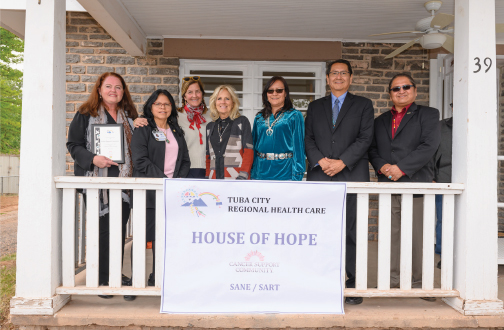Leaders of the Navajo Nation, the Tuba City Regional Health Care Corporation (Tuba City), and the Cancer Support Community (CSC) joined Jill Biden, EdD, on the Navajo Nation in the opening of the first full-time cancer center on an American Indian reservation. The culturally adapted cancer care center at Tuba City will provide oncology services to the Navajo and Hopi people of the Navajo Nation, located across parts of Arizona, Utah, and New Mexico. In addition, the programming will include patient and caregiver support and navigation that Tuba City developed in partnership with CSC.

Tribal and health leaders visit the House of Hope. From left to right: Kim Thiboldeaux; Lynette Bonar; Joanie Hall, of the Barbara Bradley Baekgaard Family Foundation; Jill Biden, EdD; Phefelia Nez, First Lady of the Navajo Nation; Jonathan Nez; Chris Curtis, Chair of the Tuba City Regional Health Care Corporation Board of Directors.
The 2-day commemoration included remarks from Navajo Nation President Jonathan Nez and Dr. Biden. Dr. Biden’s advocacy for patients with cancer included support for this effort during the Obama administration and as part of the Biden Cancer Initiative. President Nez and Dr. Biden joined Lynette Bonar, Chief Executive Officer of Tuba City, and Kim Thiboldeaux, Chief Executive Officer of CSC, and other leaders, for a tour of the new treatment center, where they met with the oncologists providing care and heard from patients and caregivers. Additionally, they visited the House of Hope, a location near Tuba City where patients and caregivers can access support and navigation services (see photo).
Filling a Gap in Cancer Treatment
The new center will fill a gap in cancer treatment that affects many American Indians. The presence of a full-time cancer center serving the Navajo Nation will permit better access to cancer screening, treatment, navigation, counseling, and other patient-focused services.
The Indian Health Service provides primary medical care, but specialty care—including oncology—is beyond its mission. Consequently, patients from the Navajo Nation—which is the size of West Virginia—must travel hundreds of miles from home to access cancer treatment and support services. Accessibility is an issue, as the transportation costs of seeking off-reservation cancer care can be insurmountable barriers to treatment for American Indian patients who live in communities where unemployment rates are above 50% and household incomes are below the national poverty level. ■

